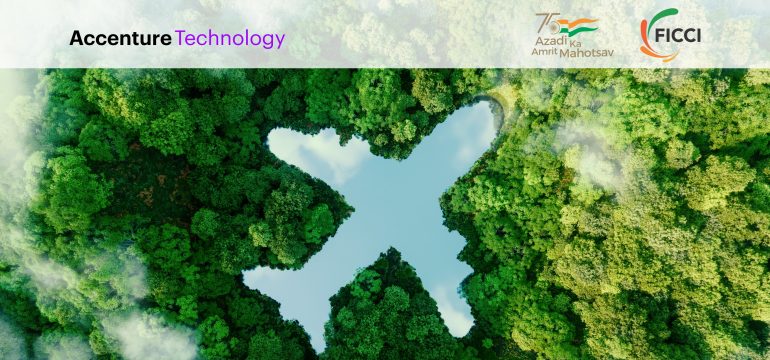Despite the relentless challenges over the past few years, from ongoing geopolitical tensions to a stratospheric rise in fuel prices, the travel industry shows signs of resiliency in the wake of post-pandemic recovery. Still, as the industry adapts to these unprecedented fundamental shifts, there is a tremendous need to address one of its greatest threats: sustainability.
From carbon emissions to social impact, the travel industry has the potential to reposition sustainability as a significant driver of positive change among consumers and policy makers—but only if businesses seize the opportunity. Now is the time for all key segments within the travel industry to reinvigorate their efforts to build the right strategy towards a sustainable future.
Shifting values
There is no question that sustainability is valuable to global travelers. Of the 25,000 consumers who participated in a survey as part of Accenture’s Life Reimagined report, 50% listed environmental and social concerns among the values that are important to them. Those values are increasingly playing out in consumers’ purchasing decisions.
Consumers may switch away from brands that don’t support their new values—but they’re also ready to pay more to those that do. According to the report, 42% of consumers say they would pay more for sustainable products and services, such as low carbon travel and hotels or resorts with the highest energy efficiency or lowest water usage; 44% would pay more for retailers offering locally produced products and services that support small businesses; and 59% said they were ready to switch their travel provider to those that promote sustainable products.
Sustainable aviation is on the horizon
A holistic approach to sustainability spanning environmental, social and governance (ESG) areas is essential for all industries. These efforts should inform conscious consumer purchasing of airline, retail, and other partners, as well as local and green sourcing throughout the entire supply chain. That should drive how the crew is hired, developed, and supported.
“What the consumer wants from us is to make them feel good, and feeling good is not just about the product, it’s not just about giving them a great flight that’s on time. It’s about how they feel,” says Scott Kirby, CEO of United Airlines.
Some airlines have already taken significant steps to address sustainability, with industry-level visions now in place. The International Air Transport Association (IATA) has committed to net-zero carbon emissions by 2050 under its Fly Net Zero plan that will make jet fuel sustainable. Getting on a pathway to net-zero requires immediate action, with the 2020s being a decisive decade to cut emissions. Leaders such as IAG, United Airlines, Delta, American Airlines, Heathrow Airport and Dallas Fort Worth International (DFW) Airport have all backed the UN’s Race to Zero campaign, aiming to halve emissions by 2030.
Innovation and efficiency improvements
Beyond sustainable aviation fuel (SAF), radical innovation will be needed to hit the 2050 net-zero target. “There are plans out there for novel, competing new technologies, like electric, hydrogen, or hybrid electric aircrafts,” says David Walfisch, principal director of Travel Strategy & Consulting at Accenture. “However, continued efficiency improvement on current technologies remains vital.”
Alaska Airlines, for example, is driving a five-part path to net-zero by 2040. As part of that, it has piloted Flyways, a software that uses artificial intelligence and machine learning to help dispatchers optimize its flight routes. During the program’s six-month trial, not only did it save 500,000 gallons of fuel, but it also cut flight times by an average of five minutes.
Accenture envisioned building a platform that would bring together airlines, corporates, cargo players, and SAF (sustainable aviation fuel) suppliers within a trusted eco-system that no individual company could build or access on its own. The platform would leverage blockchain technology to help ensure trust via data integrity, validate proof of ownership, and enable transparent tracking of the environmental benefits of SAF for customers.
To enable this, Accenture partnered with Shell and American Express Global Business Travel (Amex GBT) to jointly announce the launch of Avelia, one of the world’s first blockchain-powered digital SAF book-and-claim solutions for business travel. It is the largest SAF book-and-claim pilot at launch, offering around 1 million gallons of SAF—enough to power almost 15,000 individual business traveller flights from London to New York.
The future of hospitality is sustainable
Hospitality companies have a unique opportunity to take the lead across all dimensions of ESG and build it within the core of their operations. Those who meet their customers’ demands for more sustainable travel options will hold a competitive advantage to thrive within an uncertain landscape.
Going a step further to embrace biophilic design—or the use of natural materials and elements such as natural light, ventilation, and greenery—can help the hospitality industry cater to a new generation of guests seeking unique experiences that connect to the outside world. With rising interest in green standards for hotels, Google and Booking.com have added eco-certifications to search results, to encourage customers to make lower-carbon choices.
Carnival Corporation is at the forefront of exploring alternative fuel sources for the cruise industry. Carnival recently completed a successful pilot of powering a ship with biofuels, which are made from 100% sustainable raw materials and do not require modifications to ship engines or fuel infrastructure.
Additionally, Carnival has enabled six ships to use liquified natural gas (LNG) and plans to expand this capability to 11 new or existing ships by 2026. LNG has become a popular choice as it improves air quality by virtually eliminating all sulfur dioxide emissions and particulate matter both at sea and in port. “LNG is a ground-breaking innovation that will minimize environmental impact. Opting for LNG was a no-brainer, with the technology currently making it the most popular alternative to fossil fuels,” says Tom Strang, senior vice president at Carnival Corporation Maritime Affairs.
The path to net-zero
Meeting the UN-backed global campaign to halve global emissions by 2030 and to reach net zero by 2050 requires taking action to deliver a healthier and more resilient, low-carbon world. Today, we know that anywhere between 8% and 11% of global Green House Gas (GHG) emissions are attributable to travel and tourism, according to the UN’s Net-Zero Roadmap report. the 250 companies surveyed in the UN Net Zero Roadmap for Travel & Tourism report, only about 42% have set a climate target and publicly communicated that. Clearly, there’s still work to be done.
We have enough proof to help companies remain competitive in a sustainable world, so that their actions of today will define the world of tomorrow. To get there, it’s important that all stakeholders work with common definitions and science-backed commitments to align with leading initiatives. Only through collaboration will we in the travel and tourism sector achieve net-zero by 2050.
| Co-Authors | ||||||

Zarina Moosa Juneja |

Shridevi Bale |

Kalyani Roy |
||||

Ashish Kumar |
||||||
| Contributors | ||||||
|
||||||







